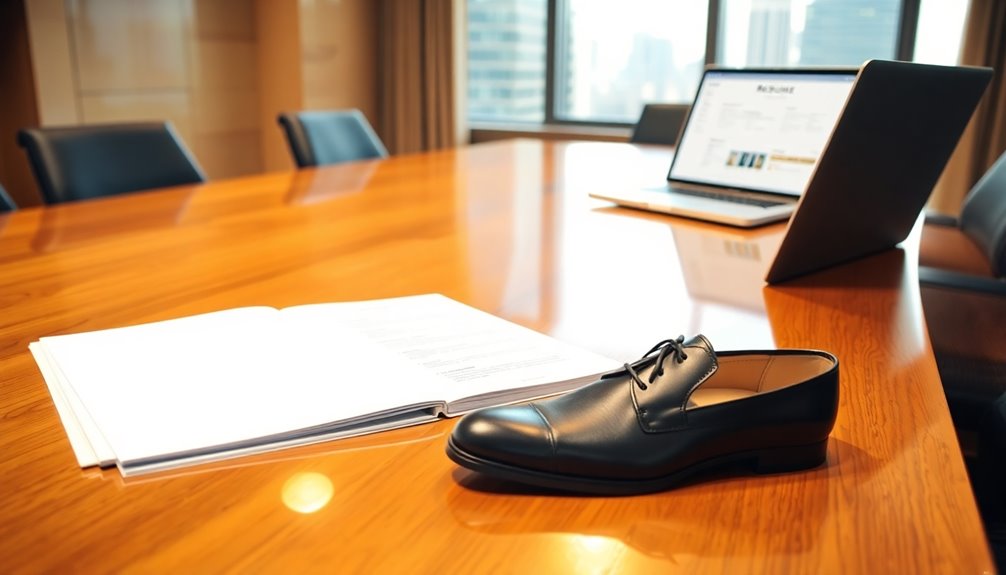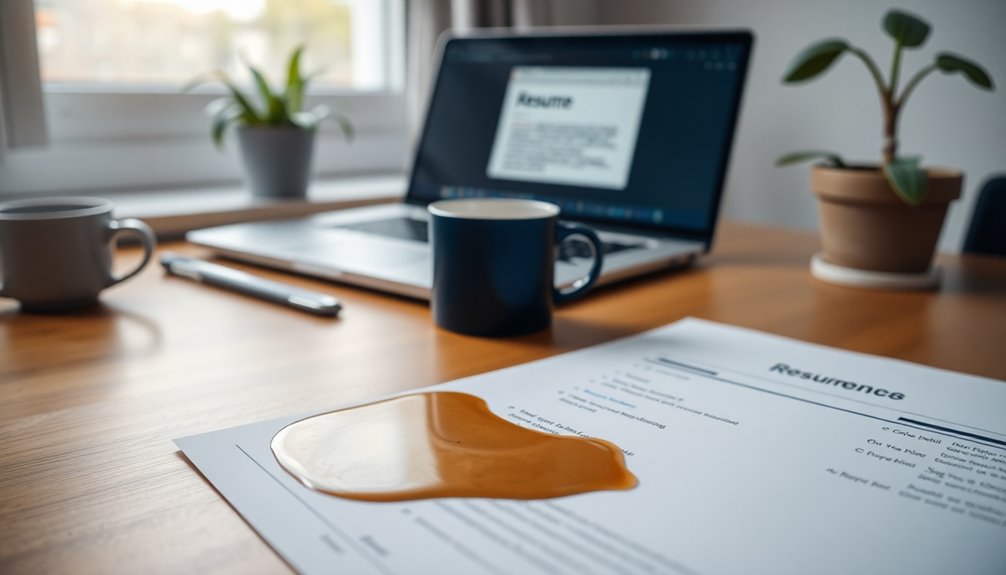To gauge your interview's success, look for key indicators like the interviewer's questions about your future availability and extended conversation length. Positive body language, such as nodding and smiling, reflects their interest. Share experiences to build rapport; maintaining eye contact keeps the connection strong. If they discuss growth opportunities, they see long-term potential in you. Sending a thoughtful follow-up can reinforce a positive impression. By recognizing these cues, you'll gain insight into how well you've connected. Stick around to discover more strategies that can enhance your interview performance and boost your chances.
Key Takeaways
- Positive body language from the interviewer, such as nodding and smiling, signals engagement and interest in the candidate.
- In-depth questions about the candidate's experiences indicate that the interviewer values their skills and potential fit.
- Extended interview duration often suggests that the candidate is being seriously considered for the role.
- Discussions about future growth opportunities reflect the company's interest in investing in the candidate's development.
- Follow-up communication from the interviewer, especially positive remarks, can indicate a favorable impression of the candidate.
Signs of Interest From Interviewer

When you're in an interview, picking up on signs of interest from the interviewer can make a big difference in how you feel about your performance.
Look for cues like questions about your future availability; they often suggest the interviewer is considering you seriously. If the interview extends longer than expected, that's usually a positive sign.
Pay attention to discussions about next steps, as they indicate strong candidate consideration. Positive follow-up communication, like emails or calls, also reflects a favorable impression.
Additionally, if they highlight growth and advancement opportunities within the company, it shows genuine interest in your potential.
Recognizing these signs can boost your confidence and help you assess how well you're connecting with the interviewer.
Building Connection and Rapport

Establishing a strong connection and rapport during an interview can considerably enhance your chances of success. Engage in a natural conversation where you share relevant experiences and insights, encouraging the interviewer to do the same.
Look for common interests or shared values; these can create a bond that makes you more memorable. Pay attention to your body language—smile, maintain eye contact, and adopt an open posture.
These signals can foster a positive atmosphere and indicate your genuine interest in the role. Remember, a relaxed and engaging dialogue reflects both your personality and potential cultural fit within the company.
Ultimately, the stronger the connection you build, the more likely you're to leave a lasting impression.
Displaying Enthusiasm and Energy

Displaying enthusiasm and energy during an interview can greatly impact the impression you leave on your interviewer. When you're engaged and show genuine interest, it creates a welcoming atmosphere, making the conversation flow more naturally. Your positive demeanor can influence the tone of the interview and signal that you're a great fit for the team. Additionally, incorporating techniques such as active listening can help you connect more deeply with your interviewer and demonstrate your commitment to the conversation.
| Signs of Enthusiasm | Tips to Show Energy | Impact on Interview |
|---|---|---|
| Smiling | Maintain eye contact | Builds rapport |
| Nodding | Use expressive gestures | Keeps engagement high |
| Proactive questions | Share personal stories | Show genuine interest |
| Positive body language | Show excitement about the role | Enhances overall perception |
| Active listening | Be responsive to cues | Indicates keenness |
Keep your energy levels up, and you'll leave a lasting impression!
Engaging With Candidate's Experience

Engaging with a candidate's experience is essential for understanding their fit for the role and the organization. When you dive deep into their background, you gain insights that can help make informed decisions.
Here are four key aspects to reflect on:
- Ask In-Depth Questions: Probing beyond surface-level inquiries shows genuine interest in their skills and experiences.
- Encourage Examples: Requesting specific examples allows candidates to illustrate their contributions and achievements.
- Listen Actively: Pay attention to their answers and ask follow-up questions to demonstrate your engagement.
- Assess Cultural Fit: Understanding their past experiences can indicate how well they might align with your organization's values and culture.
Creating a Relaxed Environment
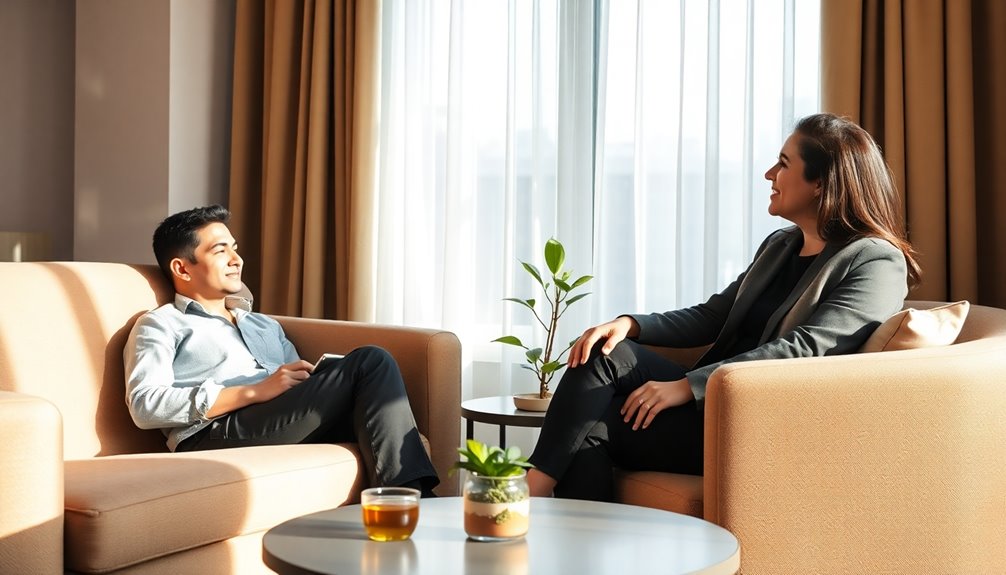
A relaxed interview environment can considerably influence a candidate's performance and comfort level. When you create a calm atmosphere, it encourages candidates to express themselves freely and confidently.
Avoid rushing through questions; instead, take your time to show genuine interest in their responses. You can foster this environment by using open body language, maintaining eye contact, and offering warm smiles.
When candidates feel at ease, they're more likely to engage in meaningful dialogue, allowing you to assess their fit for the role effectively.
Discussing Future Growth Opportunities
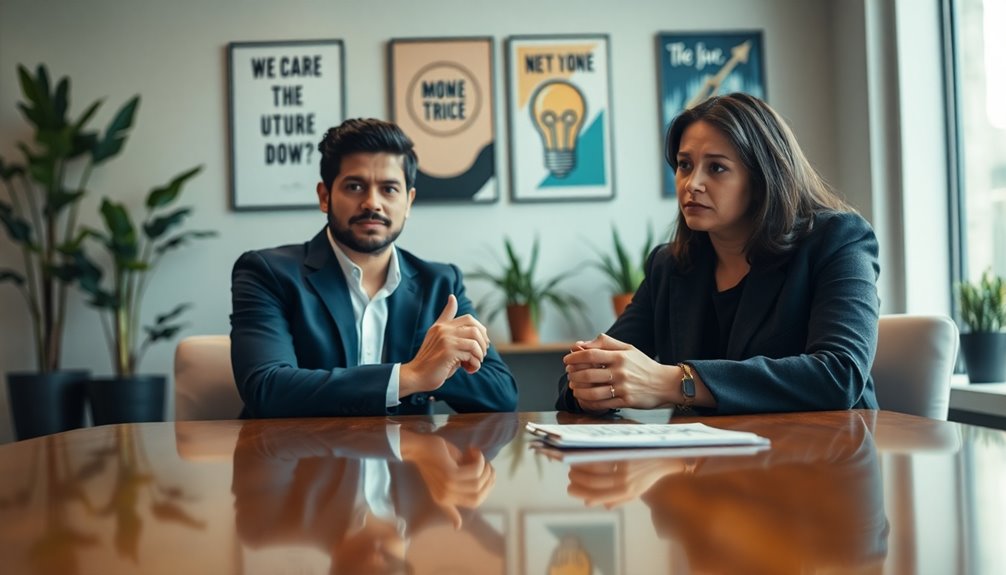
Discussing future growth opportunities during an interview can reveal a lot about both the role and the company culture. When you bring up growth, it shows your interest in long-term commitment and personal development.
Here are four points to evaluate:
- Ask about advancement paths: Inquire how employees typically progress within the company.
- Discuss training and development: Find out what resources are available for skill enhancement.
- Explore mentorship opportunities: Ask if there are mentorship programs to support your growth.
- Gauge company values: Listen for how the organization prioritizes employee development and feedback.
Analyzing Positive Responses and Cues

Positive responses and non-verbal cues during an interview can greatly enhance your understanding of the interviewer's interest in both you and your potential fit for the role.
Look for nods and smiles; these indicate engagement and agreement. When the interviewer makes affirmative comments, it shows alignment with your skills and boosts your confidence.
Pay attention to their body language—open postures and leaning in suggest receptiveness, creating a more welcoming atmosphere.
Notice the flow of conversation; if it feels easy and engaging, it likely reflects mutual interest. Additionally, in-depth questions about your experience signal strong interest, while positive reactions can markedly enhance your overall interview experience.
Recognizing these cues can empower you to navigate the interview more effectively.
Understanding Follow-Up Communication
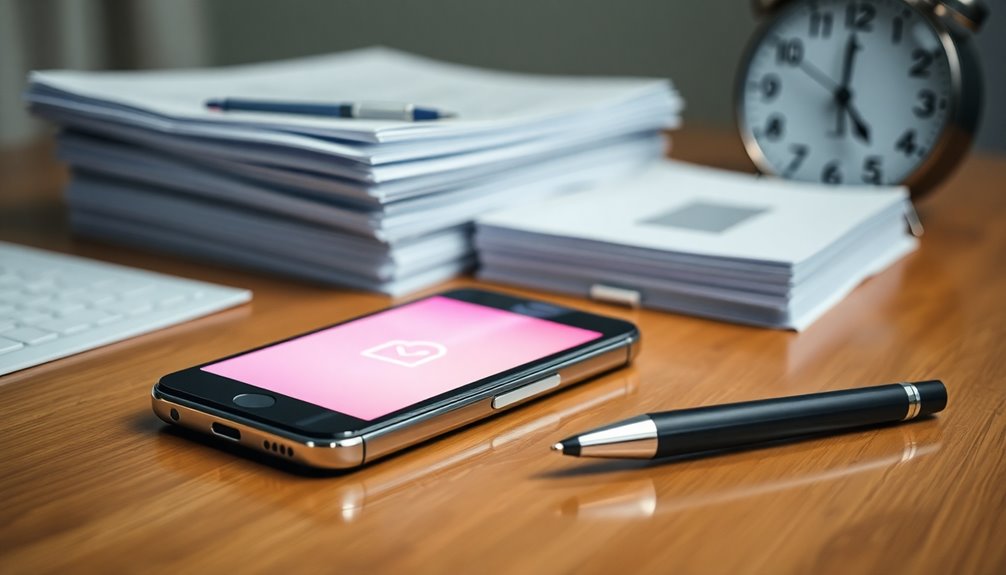
Recognizing the importance of follow-up communication can greatly impact your job search success. Sending a thoughtful follow-up shows your enthusiasm and professionalism.
Here are four key points to reflect on:
- Timing Matters: Aim to send your follow-up within 24-48 hours after the interview.
- Personal Touch: Reference specific topics discussed during the interview to make your message memorable.
- Express Gratitude: Thank the interviewer for their time and insights, reinforcing your interest.
- Clarify Next Steps: Politely inquire about the timeline for the hiring decision, showing your keenness.
Frequently Asked Questions
How Should I Prepare for Common Interview Questions?
To prepare for common interview questions, start by researching the company and role.
Practice your responses to typical questions, focusing on your experiences and achievements. Use the STAR method (Situation, Task, Action, Result) to structure your answers.
Rehearse with a friend or in front of a mirror to build confidence.
Finally, prepare thoughtful questions to ask the interviewer, showing your interest and initiative during the conversation.
What Should I Wear to an Interview?
Imagine you're a knight preparing for a grand quest. Your armor—a polished suit or a smart dress—reflects your readiness to conquer.
Stick to neutral colors and avoid flashy patterns; you want to shine not blind. Footwear should be sturdy yet stylish, because comfort matters on your journey.
Accessorize wisely; a watch or simple jewelry can add flair. With the right attire, you'll boost your confidence and present yourself as the hero of your story.
How Can I Handle Difficult Interview Questions?
When you face difficult interview questions, stay calm and take a moment to think before you respond.
It's okay to ask for clarification if you don't understand something.
Use the STAR method—describe the Situation, Task, Action, and Result—to structure your answers effectively.
Remember, honesty is key; if you don't know an answer, admit it and express your willingness to learn.
This approach shows your problem-solving skills and adaptability.
What Should I Do if I Feel Nervous During an Interview?
If you feel nervous during an interview, take a deep breath and remind yourself that it's normal to feel this way.
Try to focus on the questions rather than your anxiety. Practice positive self-talk, and visualize a successful outcome.
Remember, the interviewer wants you to succeed. Make eye contact and engage in the conversation; this can help you feel more connected and less anxious.
You've got this!
How Can I Research the Company Before My Interview?
Did you know that 78% of candidates research a company before an interview?
To stand out, immerse yourself in the company's website, social media, and recent news articles. Explore their mission, values, and culture to align your responses with their goals.
Don't forget to check employee reviews for insights into work-life balance and growth opportunities.
This preparation not only boosts your confidence but also shows genuine interest in the role and company.
Conclusion
In the intricate dance of job interviews, recognizing the subtle signals can be your guiding light. When you spot genuine interest, a relaxed atmosphere, and engaging questions, you know you're on the right path. By tuning into these cues, you can turn potential uncertainties into stepping stones toward success. So, embrace the rhythm of the conversation, and let your confidence shine—after all, every interview is a new stage waiting for your performance.
Eugene brings a fresh, dynamic voice to our platform as one of our talented Writers. Specializing in research-driven content, he explores the latest findings in psychology and personal growth, translating them into actionable insights for our readers. Eugene’s work is fueled by a curiosity about what makes us tick and a desire to help others unlock their potential.




